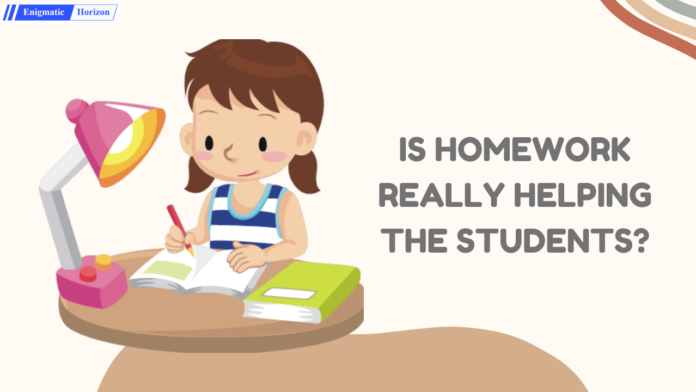Leema Buragohain (Sub-editor)
Homework is a word that often triggers a sense of dread among students. It is known as a basic concept in traditional education. Some believe that homework is a necessary part of school, while others believe that the time could be better invested. So, is homework really beneficial for students? Let us discuss its advantages as well as disadvantages.
Reinforcement of Learning: Homework gives students a platform to consolidate and apply what they have learnt in the classroom. By training and reinforcing their concepts, students can improve retention, which improves academic performance.
Developing Independent Study Skills: One of the main benefits of homework is the ability to promote independent study skills. Students learn self-discipline, time management and responsibility by completing assignments outside the classroom. These skills are invaluable for lifelong learning and self-directed learning.
Preparation for Next Lessons: Homework can be a preparation that allows students to familiarize themselves with upcoming topics. This prior exposure can pique their interest, encourage engagement, and improve understanding during subsequent classroom discussions.
Involvement of Parents: Assigning homework can encourage parents’ involvement in their child’s education. Parents have the opportunity to participate in their child’s studies by offering support and guidance in their homework. Such cooperation between parents and students can create a favourable learning environment.
Disadvantages of Assigning Homework:
Increased stress and pressure: Homework often adds to an already existing workload and can increase stress levels. Students must complete multiple assignments with tight deadlines, which creates anxiety and pressure to perform well. This can have a negative impact on mental health and general well-being.
Limited Free Time: Homework takes up a significant portion of a student’s free time, leaving little room for relaxation, hobbies and extracurricular activities. This lack of balance can hinder opportunities to communicate with others, pursue personal interests, or engage in physical activity, all of which are necessary for a student’s holistic development.
Potential for inequity: Not all students have access to the same resources or favourable environment for homework. Some may lack internet access, a quiet study space or the necessary materials, which puts them at a disadvantage compared to their peers. This disparity can increase academic disparities and hinder educational opportunities.
Limited time for research and creativity: Homework often follows a structured format and focuses on specific topics or skills. This can leave little room for students to explore their interests, think creatively, or engage in self-directed learning. The emphasis on completing tasks can limit opportunities for deep and independent thinking.
Reduced family time: Too much homework can interfere with valuable family time. Students may have limited opportunities to connect with family, engage in meaningful conversations, or participate in collaborative activities. This can strain relationships and prevent the development of strong family relationships.
By making education a joyful and entertaining experience, we can significantly increase student engagement along with their joy in learning. Incorporating fun elements into the education system taps into students’ innate curiosity and creates an environment that fosters a true love of learning. When education becomes fun, students become more actively involved in their learning. Instead of perceiving it as a burden, they approach it with enthusiasm and eagerness. By combining interactive activities, educational games, multimedia presentations and hands-on experiments, we can add dynamism and excitement to learning. If this occurs, is there really a need for homework?
This approach not only engages students’ attention, but also encourages them to explore, discover and develop a deep understanding of the subject. In conclusion, turning education into an entertainment tool can revolutionize learning for students. By embracing creativity, communication and engagement, we can ignite a true passion for learning. This approach fosters a love of knowledge, encourages active participation, and fosters a lifelong commitment to education. By making learning enjoyable and exciting, we enable students to become enthusiastic, curious and motivated learners who approach education with joy and enthusiasm. Ultimately, this paradigm shift can have a profound impact on students’ academic achievement, personal growth, and overall fulfilment in the pursuit of knowledge. Thus, the need for homework will reduce. And even if academic institutions assign homework, it will seem as fun as entertainment for the students, rather than a chore.
